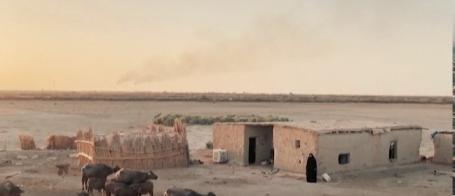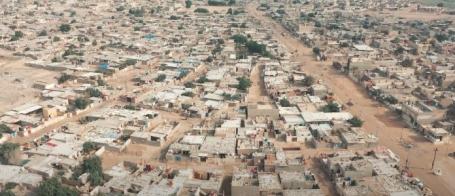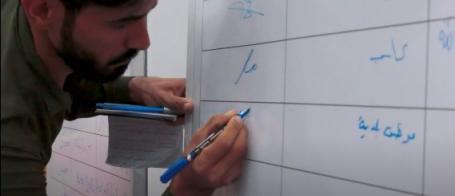Bridging divides between IDPs and host communities in Iraq through dialogues on climate change

Severe climate change impacts in Iraq are reshaping its social and economic landscapes. Among those most acutely affected are farmers in the Dhi Qar and Missan governorates, where heat waves and water shortages have become more frequent, resulting in increasing levels of crop failure and livestock loss. With their livelihoods at risk, many young farmers abandon their farms and migrate to urban centres like Basra. Upon arrival they often find themselves in informal settlements without water, electricity or job opportunities — and at risk of being driven into illicit economies or violence to survive.
This displacement and the resulting increase in competition over scarce resources strain local services and exacerbate tensions between IDPs and host communities that a government — with low levels of public trust and inadequate conflict management mechanisms — is often unequipped to deal with.
Many people were displaced to Al-Zubair from other governates, and this has been seen across Basra governorate. It has affected, directly and indirectly, some prevailing tribal traditions and customs.
– Participant of dialogue series, Al-Zubair, December 2023

Integrating climate and environmental security into peace programming to transform tensions
Over the past two years, the Berghof Foundation and its Iraqi partner Peace Paradigms Organisation (PPO) have been integrating climate and environmental security into peace programming to address this complex problem.
It started with listening. Separate sessions were held where members of IDPs and host communities were able to express their experiences, needs and grievances. Host communities accused IDPs of bringing tribal conflicts and crime to their city. IDPs reported facing discrimination and violence.
Through the dialogues, we are currently trying to counter these incidents, which are caused by these big community changes. Understanding and accepting others is the basic element in confronting tensions and conflicts
– Mayor of Al-Zubair, Al-Zubair, December 2023
Dialogue can overcome these feelings of aversion and foster understanding of diverse perspectives and encourage learning from others' experiences. Through dialogue, participants are given the space to work towards a common understanding, break down stereotypes, and build meaningful relationships.
This is also being observed between the participants of the joint dialogue in Al-Zubair. During the dialogue, both groups began to identify shared needs and risks to their livelihoods such as lack of services, unemployment and school kidnappings. Participants also recognized climate change as a shared issue that exacerbates existing challenges. Women from both communities reported an increased threat of gender-based violence.
A social pact to address climate security risks
Promoting communal peace and harmony among all the members of Al-Fidaa neighbourhood is a shared responsibility between all community, security, administrative and religious actors.
– Participant of dialogue series, Al-Zubair, December 2023

The communities then took their shared concerns to the mayor, local authorities, community police, and tribal and religious leaders with the aim to collaboratively tackle the most pressing issues and mitigate climate-related risks. The process and mechanism were formalized in a social pact that was signed by all 30 dialogue participants. This is the first social pact in Hay Al-Fidha addressing conflicts and tensions between both communities.
Tribal problems were among the most important problems that Peace Paradigms Organisation and Berghof Foundation identified and analysed. As a result, the social pact emerged, where all signatories committed themselves to implement all the principles and recommendations that they agreed upon which was held and supported by PPO and BF.
– Independent Member of Parliament, Al-Zubair, December 2023
Through this participatory process, the initiative instilled a sense of ownership and responsibility in both communities and authorities to develop practical solutions to tackle climate security risks, ultimately building a more resilient and peaceful community.
The overwhelmingly positive feedback from dialogue participants led to the adoption of a larger-scale approach to cover more neighbourhoods in Al-Zubair. The Berghof Foundation and PPO plan to further expand this dialogue initiative to enable even more people to participate in efforts toward peace and climate security.
Disclaimer: The quotes found in this article have been translated from Arabic into English and edited for clarity by Samer Ameen.
This impact story was prepared by: Nike Löble, Andreas Schädel (Berghof Foundation), Ammar Zakri (Peace Paradigms Organisation), Alexandra Steinkraus and Sinéad Barry (adelphi research)
Share on

